University of St. Gallen
|
Universität St. Gallen | |
 | |
| Type | Public |
|---|---|
| Established | May 25, 1898 |
| Budget | CHF 231.6 million (2016)[1] |
| President | Thomas Bieger |
Academic staff |
98 professors[1] 81 assistant professors[1] |
Administrative staff | 2962 |
| Students | 8,553 (2017; ♀: 35 %)[1] |
| Undergraduates | 4,710 (2017)[1] |
| Postgraduates | 3,202 (2017)[1] |
| 624 (2017)[1] | |
Other students | 17 (2017)[1] |
| Location |
St. Gallen, Canton of St. Gallen, Switzerland Coordinates: 47°25′54″N 9°22′29″E / 47.43167°N 9.37472°E |
| Campus | Urban (Rosenberg hill) |
| Newspapers | HSG Focus, Prisma |
| Colors |
Green, White and Black |
| Affiliations | CEMS, APSIA, EQUIS, AACSB Association of Professional Schools of International Affairs |
| Website | www.unisg.ch |
The University of St. Gallen (German: Universität St. Gallen) is a research university located in St. Gallen, Switzerland. Established in 1898, it specialises in the fields of business administration, economics, law, and international affairs.[2] The University of St. Gallen is also known as HSG, which is an abbreviation of its former German name Handels-Hochschule St. Gallen. In the fall of 2016, the University of St. Gallen had 8,337 students, of which 3,097 were master's students and 675 were doctoral students.[1] According to international rankings the University of St. Gallen is considered to be among the leading business schools globally.[3][4][5][6][7][8][9][10][11]
Despite being one of the smallest universities in Switzerland, the University of St. Gallen has Switzerland's largest faculty for business administration.[12] The University of St. Gallen is a member of the CEMS and APSIA networks. It is EQUIS and AACSB accredited. The campus is listed as a Swiss heritage site of national significance.[13]
History
19th and 20th centuries
In May 1898, the Cantonal Parliament of St. Gallen decided to establish an academy for trade, commerce, and administration in St. Gallen. The actual founding father is considered to be Theodor Curti, then the head of the Department of Economic Affairs of the Canton of St.Gallen. In 1899, the business academy started with its lectures, making it one of the first institutions of that kind in the world. From 1911 on, the name Handels-Hochschule was used. In 1938, the former foundation under private law became a public institution and in 1939 it gained the right to award doctoral degrees.
In 1963, the university moved to new buildings and changed its name to Hochschule für Wirtschafts- und Sozialwissenschaften. The new buildings were planned for 900 students, but already in the winter term of 1963/64, more than 1150 students were enrolled. With the enaction of the higher education act of 1989, the university was renamed Hochschule St. Gallen für Wirtschafts-, Rechts- und Sozialwissenschaften, now reflecting the actual subjects covered. Since 1978, the University of St. Gallen had its own law department. Also in 1989, the library building opened and the number of students became more than 3900. In February 1994, the Cantonal Parliament of St. Gallen approved bill to amend the Higher Education Act, leading to a renaming of the institution as Universität St. Gallen (University of St. Gallen). The acronym HSG remained.
Recent history
In winter 2001/02, the University of St. Gallen started the reorganization of its study programs. Education became classified into bachlelor's and master's degrees, making the University of St. Gallen Switzerland's pioneer in the Bologna process.
Mid-2005, people in St. Gallen voted with 66.4% for a construction project to renovate, reorganize, and expand the University of St. Gallen by 2011. With a project budget of about 80m Swiss francs, buildings from the 1960s were renovated and the infrastructure adjusted to the new educational structure. In October 2005, also the newly founded Executive School of Management, Technology and Law (ES-HSG) opened. The Executive School is financially autonomous and centralizes further educational activities, such as MBA and executive MBA programs.
International Rankings
| 2014 | 2015 | 2016 | 2017 | 2018 | |
|---|---|---|---|---|---|
| FT - European Business School | 6th | 4th | 5th | 4th | |
| FT – Master in Management (HSG Program)[14][15] | 1st | 1st | 1st | 1st | 1st |
| FT – Master in Management (CEMS Program)[14] | 5th | 4th | N/A* | 9th | |
| FT - Master in Finance[14] | 6th | 10th | 8th | 10th | 6th |
| FT – Global MBA[14] | 88th | 67th | 60th | 59th | 60th |
| FT - Executive Education – Open[14] | 27th | 27th | 38th | 28th | 28th |
| FT - Executive MBA[14] | 51st | 41st | 46th | 45th | |
| The Economist – Master in Management[16] | – | – | – | 5th | |
| Bloomberg – International MBA Programs | - | - | 16th | 17th | |
| Handelsblatt – Business Administration (research output)[17] | 1st | - | - | - | |
| Handelsblatt – Economics (research output)[18] | - | 11th | - | 9th | - |
*In 2016, CEMS refused to take part in the yearly FT Ranking. The program made its comeback in 2017 at the 9th place.
Campus
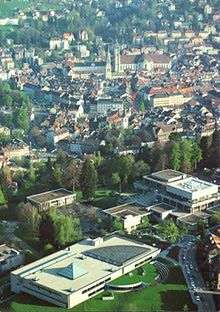
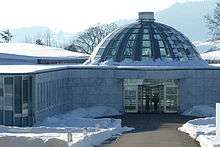
The University of St. Gallen is located on top of Rosenberg hill, overlooking the picturesque Altstadt of St. Gallen and with a view of the Alpstein mountain range. A remarkable feature is the integration of art and architecture throughout the campus.[19]
In the Main Building, designed by Walter Foerderer and regarded as a significant example of 1960s architecture far beyond Switzerland's borders, art tends to play the role of a counterpart to architecture, whereas in the Library Building of 1989, the works of art complement the diversity of architectural forms in a narrative fashion. There are works by Burckhardt, Mastroianni, Kemény, Penalba,[20] Arp, Braque, Hajdu, Soniatta, Miró, Calder, Soulages, Giacometti, Tàpies, Coghuf, Valentin, Otto Müller, Stahly, Baier, Bodmer, Oertli, Gehr, Gubler, Prantl, Baumgarten, Disler, Bill, Josef Felix Müller, Paladino, Richter, Fabro, and Cucchi.
Many facilities for leasure activities such skiing, hiking, climbing and sailing and located near the town of St. Gallen at Lake Constance or in the Alps.
In 1995, a convention and executive education center opened a few minutes’ walk from the main university campus. Extended in 2007, it today comprises several plenary halls as well as 54 business rooms.[21] The University of St. Gallen also maintains international hubs in Singapore and São Paulo to connect local faculty, students, alumni, and companies with academic activities.[22]
Academics
Schools, institutes, and research centers
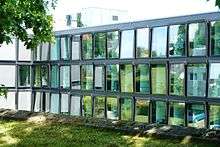
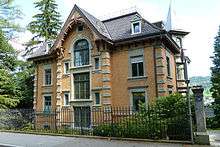
Following a restructuring in 2011, there are five schools at the University of St. Gallen: the School of Management (SoM-HSG), the School of Finance (SoF-HSG), the Law School (LS-HSG), the School of Economics and Political Science (SEPS-HSG), and the School of Humanities and Social Sciences (SHSS-HSG). Study programs are typically associated with a specific school but are taught jointly by faculty members from several schools. The Executive School of Management, Technology and Law (ES-HSG) plays a special role which has the status of an Institut mit besonderen gesamtuniversitären Aufgaben and which runs the MBA and executive education programs.[23]
The crystallization points of research at the University of St. Gallen are about 40 institutes and research centres, which are an integral part of the university. The directors of the institutes double as professors of the University of St. Gallen. Bringing theory and practice together, the institutes provide an important input for teaching at the University and play a significant role in furthering the careers of young academics. 80 tenured professors, 60 assistant professors and senior lecturers, and more than 300 lecturers and 300 assistants, plus distinguished visiting professors cultivate the scientific discourse with the students.
The University of St. Gallen is a member of the European Research Center for Information Systems (ERCIS) and the Auto-ID Labs network.
Study programs
A new structure of Studies became operational as of winter 2001/2002. Degrees are now divided into Bachelors, Masters, and Doctoral programs in accordance with the Bologna Process. Courses at the Bachelor level are typically taught in German, while many Master's programs and most Doctoral programs are taught in English. Since 2013, the bachelor's degree programs has started with an assessment year for all students. The assessment year was introduced in two separate tracks (German/English) in order to improve the teacher/student ratio.[24] Upon successful completion of this year, students can then choose one of five majors for their remaining two years of study as listed below. The majority of Bachelor students are enrolled in Business Administration. Besides the University of St. Gallen only the University of Geneva offers an International Affairs program within Switzerland. The Master's programs cover the same range of studies, but are more specialized. The Masters programs typically run from 1.5 to 2 years. Besides the CEMS Master’s in International Management, further double degrees may be obtained in cooperation with partner universities such as Bocconi University, ESADE, HEC Paris, INCAE Business School, Nanyang Technological University, The Fletcher School of Law and Diplomacy, Rotterdam School of Management, or Sciences Po Paris.[25][26]
Student life

The University of St.Gallen hosts 25% international students, an upper limit which has been fixed by the government.[27]
There are about 80 clubs at the University of St. Gallen. Particularly well-known is the International Students' Committee, an organization which plans and coordinates the annual St. Gallen Symposium. Since 1970, the St. Gallen Symposium has brought together leaders from business, science, politics and society with students from all over the world. AIESEC St. Gallen is a club that was founded in 1951 and that provides an international internship program. The largest club at the University of St.Gallen and the largest of its kind in Switzerland is the HSG Investment Club, a finance-focused career club with over 1,300 members.[28] One of the largest clubs with more than 600 members is DocNet, the doctoral students' club at the University of St. Gallen. Founded in 2001, a major event of DocNet is the annual DocNet Management Symposium. A chapter of Oikos International, a student organization for sustainable development, also plays an active role at the University of St. Gallen. Other clubs are mostly sports clubs, cultural clubs, or associations of students of different countries or cantons, subject-specific clubs related to specializations at the University of St. Gallen as well as fraternities.[29]
The official organization of former students of the University of St. Gallen is HSG Alumni. With more than 19,000 members and 80 alumni clubs on 4 continents, it is one of Europe's leading associations of its kind. Since 1930, the club has been reinforcing the alumni's lifelong bonds with the University, as well as the networks among its members, by means of numerous events and information platforms.[30]
Notable people
Alumni
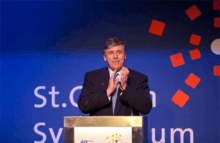
Notable University of St. Gallen alumni in the financial sector include Deutsche Bank Chairman Paul Achleitner,[31] former Deutsche Bank CEO Josef Ackermann,[32] former Commerzbank CEO Martin Blessing,[33] former Julius Baer Group CEO Alex Widmer,[34], former UBS CEO Peter Wuffli[35], current N26 CEO and founder Valentin Stalf[36]. Business leaders in other sectors who attended the University of St. Gallen include Swatch Group CEO Nick Hayek, Jr.,[37] IWC CEO Georges Kern,[38] Qiagen CEO Peer M. Schatz,[39] Fresenius SE CEO Ulf Mark Schneider,[40][41] Thomas Cook Group CEO, Peter Fankhauser,[42] and BASF board member Margret Suckale.[43] In the intellectual space, notable alumni include novelist and bestselling author Rolf Dobelli. In the field of law and politics, notable alumni include Swiss politician and former President of the Swiss Council of States Christoffel Brändli,[44] Sovereign Monarch and Head of State of Liechtenstein Prince Hans-Adam II,[45] Swiss politician Hans-Rudolf Merz,[46] Swiss politician and Stadler Rail CEO Peter Spuhler,[47], Swiss politician Heinz Indermaur, as well as Adrian Hasler, and Klaus Tschütscher, current, and former Prime Minister of Liechtenstein, respectively.[48]
Faculty and staff
Notable current or former faculty members of the University of St. Gallen include the Advocate General of the Court of Justice of the European Union Juliane Kokott,[49] corporate communication professor Miriam Meckel,[50] Walter Hunziker, developer of Tourism Science, and Ota Šik, Professor of Economics and one of the key figures in the Prague Spring.[51]
Partner universities
University of St. Gallen has partnership agreements and cooperations with various universities, including the following:[52]
- Columbia University
- Copenhagen Business School
- Cornell University
- Dartmouth College
- Duke University
- ESADE
- HEC Paris
- IE University
- INCAE Business School
- Imperial College London
- Andrássy University Budapest
- Instituto de Empresa
- Keio University
- London School of Economics and Political Science
- Manchester Business School
- McGill University
- National University of Singapore
- New York University
- Northwestern University
- Peking University
- Sciences Po
- Seoul National University
- Stockholm School of Economics
- Tsinghua University
- Bocconi University
- Universidad de los Andes
- University of Melbourne
- University of Navarra
- University of Sydney
- University of California, Los Angeles
- University of Southern California
- University of Chicago
- University of Michigan
- University of Toronto
- Warwick Business School
- Yonsei University
See also
References
- 1 2 3 4 5 6 7 8 9 "". University of St. Gallen website. Retrieved June 09, 2017.
- ↑ "University of St.Gallen – University – University of St.Gallen: portrait". Retrieved 20 July 2015.
- ↑ "Business school rankings from the Financial Times - FT.com". rankings.ft.com.
- ↑ "Handelsblatt BWL-Ranking 2014: St. Gallen ist der Star unter den Unis".
- ↑ "Masters in Management 2017 Ranking". The Economist.
- ↑ "These Are the Best International Business Schools" – via www.bloomberg.com.
- ↑ "Universität St.Gallen - Universität - Universität St.Gallen - Aktuelle Rankingergebnisse". HSG Startseite.
- ↑ "Business & Management Studies". 2 March 2017.
- ↑ "EQUIS Accredited Schools". European Foundation for Management Development (EFMD) website. Retrieved September 6, 2011.
- ↑ "AACSB International Educational Members Archived 2010-12-26 at the Wayback Machine.". Association to Advance Collegiate Schools of Business (AACSB) website. Retrieved September 6, 2011.
- ↑ Ortmans, Laurent (2018-09-10). "Global Masters in Management ranking 2018: analysis and methodology". Financial Times. Retrieved 2018-09-11.
- ↑ "Die Top-Fakultäten: Deutsche Betriebswirte fallen zurück – Ökonomie – Politik" (in German). Handelsblatt. 2012-09-17. Retrieved 2013-08-04.
- ↑ "Swiss inventory of cultural property of national and regional significance". A-Objects. Federal Office for Cultural Protection (BABS). 1 January 2017. Retrieved 6 September 2017.
- 1 2 3 4 5 6 "Business school rankings from the Financial Times - FT.com". rankings.ft.com. Retrieved 2018-03-01.
- ↑ "Business school rankings from the Financial Times - FT.com". rankings.ft.com. Retrieved 2018-09-11.
- ↑ "Masters in Management 2017 Ranking". The Economist. Retrieved 2018-03-01.
- ↑ "Handelsblatt BWL-Ranking 2014 - die forschungsstärksten BWL-Fakultäten in Deutschland, Österreich und der Schweiz - Handelsblatt Online". tool.handelsblatt.com.
- ↑ "Handelsblatt-VWL-Ranking 2017: Zürichs Ökonomen holen Platz eins".
- ↑ "University of St.Gallen – Services – Guided art tours". Retrieved 20 July 2015.
- ↑ de:Penalba
- ↑ "University of St.Gallen | Executive Education | University of St.Gallen – Convention and Executive Education Center". Unisg.ch. Retrieved 2013-08-04.
- ↑ "University of St.Gallen | University | HSG branches around the world". Unisg.ch. Retrieved 2013-08-04.
- ↑ "University of St.Gallen – University – University of St.Gallen – structure". Retrieved 20 July 2015.
- ↑ "University of St.Gallen | Studying | The Assessment Year". University of St.Gallen. Retrieved 2018-01-24.
- ↑ "Universität St.Gallen | Studieren | Master-Stufe". Master-stufe.unisg.ch. Retrieved 2013-11-04.
- ↑ "University of St.Gallen | Studying | Ph.D. Programme". Phd.unisg.ch. Retrieved 2013-08-04.
- ↑ "University of St.Gallen – Studying – University of St.Gallen, exchange programmes, Student Mobility". Retrieved 20 July 2015.
- ↑ "Home". HSG Investment Club. Retrieved 2016-11-14.
- ↑ "Archived copy". Archived from the original on 16 December 2013. Retrieved 4 November 2013.
- ↑ "Universität St.Gallen". Alumni.unisg.ch. 2012-09-26. Retrieved 2013-08-04.
- ↑ "Deutsche Bank – Aufsichtsrat". Deutsche-bank.de. Retrieved 2014-04-27.
- ↑ "Deutsche Bank – Vorstand". Db.com. 2013-04-17. Retrieved 2013-08-04.
- ↑ "Chairmen of Commerzbank Board of Managing Directors" (PDF) (in German). Commerzbank. Retrieved 2014-04-27.
- ↑ "CEO of top Swiss bank dies suddenly, sparking rumours of suicide". Daily Mail.
- ↑ "Peter Wuffli". Nndb.com. Retrieved 2013-08-04.
- ↑ "Valentin Stalf - Co-Founder & CEO @ N26 | Crunchbase". Crunchbase. Retrieved 2018-08-30.
- ↑ "Profiles". European CEO. Retrieved 2013-08-04.
- ↑ "Roger Dubuis Watches, Collections, History & News". WorldTempus. Retrieved 2013-08-04.
- ↑ "Peer Schatz". www.qiagen.com.
- ↑ "Fresenius SE & Co. KGaA – Vorstand". Fresenius.de. 18 July 2013. Archived from the original on 19 July 2013. Retrieved 4 August 2013.
- ↑ Ulf Schneider Dr. "Köpfe: Ulf Schneider – Köpfe – Wirtschaftswoche" (in German). Wiwo.de. Archived from the original on 9 June 2012. Retrieved 4 August 2013.
- ↑ "Peter Fankhauser". Businessweek. Retrieved 26 November 2014.
- ↑ von Claudia Tödtmann. "Köpfe: Margret Suckale – Köpfe – Wirtschaftswoche" (in German). Wiwo.de. Archived from the original on 21 February 2012. Retrieved 4 August 2013.
- ↑ Archived 21 May 2013 at the Wayback Machine. University of St. Gallen
- ↑ "Prince Hans-Adam II". Fuerstenhaus.li. Archived from the original on 27 June 2013. Retrieved 4 August 2013.
- ↑ "Index of Federal Councillors since 1848". admin.ch. Retrieved 2013-08-04.
- ↑ Holding, PCS. "PCS Holding". www.peter-spuhler.ch.
- ↑ "Regierung des Fürstentums Liechtenstein: Äusseres". Regierung.li. Archived from the original on 6 October 2013. Retrieved 4 August 2013.
- ↑ "Archived copy". Archived from the original on 9 February 2012. Retrieved 17 January 2012.
- ↑ "Universität St.Gallen – Forschungsplattform: Miriam Meckel". Alexandria.unisg.ch. Retrieved 2013-08-04.
- ↑ "Ota Sik – Reforming Czech economist and politician". The Independent. August 27, 2004.
- ↑ Liste der Partneruniversitäten Homepage HSG, accessed 8 January 2018
Bibliography
- Boller, Gabrielle (1998). Kunst und Architektur im Dialog: Universität St. Gallen (in German). Benteli. ISBN 3-71651-076-9.
- Burmeister, Karl Heinz (1998). 100 Jahre HSG: Geschichte der Universität St. Gallen, Hochschule für Wirtschafts-, Rechts- und Sozialwissenschaften (in German). Bern: Stämpfli. ISBN 3-72729-248-2.
External links
| Wikimedia Commons has media related to Universität St. Gallen. |